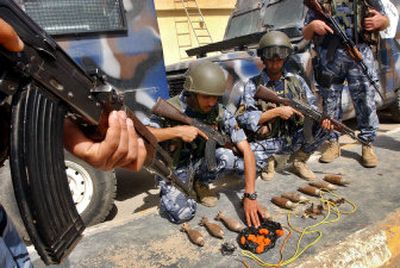Iraq parliament delayed

BAGHDAD, Iraq – Iraq’s president failed in a bid Monday to order parliament into session by Sunday, further delaying formation of a government and raising questions about whether the political process can withstand the unrelenting violence or disintegrate into civil war.
The deadlock came as snipers assassinated Maj. Gen. Mibder Hatim al-Dulaimi, the Sunni Arab in charge of Iraqi forces protecting the capital. A torrent of bombings and shootings killed 25 more Iraqis on Monday, ending a relative lull in violence.
At the heart of the dispute is a controversy over the second-term candidacy of the Shiite prime minister, Ibrahim al-Jaafari, whose most powerful supporter is the anti-American cleric Muqtada al-Sadr.
The Sunni Arab minority blames al-Jaafari for failing to control the Shiite militiamen who attacked Sunni mosques and clerics after the Feb. 22 shrine bombing in Samarra. Kurds are angry because they believe al-Jaafari is holding up resolution of their claims to control the oil-rich city of Kirkuk.
In a bid to force a showdown in the dispute, President Jalal Talabani, a Kurd, announced he would order parliament to convene Sunday for the first time since the elections in December and the ratification of the results on Feb. 12.
Such a meeting would have started a 60-day countdown for the legislators to elect a president, approve al-Jaafari’s nomination as prime minister and sign off on his Cabinet.
Talabani was mistakenly counting on the signature of Vice President Adil Abdul-Mahdi, a Shiite, who lost his own bid for the prime minister’s nomination by one vote to al-Jaafari. Talabani had in hand a power of attorney from the other vice president, Ghazi al-Yawer, a Sunni, who was out of the country.
Abdul-Mahdi declined to sign, at least for now. In an emergency meeting with Talabani on Monday, seven Shiite leaders rejected his demand for them to abandon al-Jaafari’s nomination.
It remained unclear when parliament might convene.
Many of Monday’s attacks targeted the country’s Shiite-led security forces, accused by Sunni Arabs of repeated abuses against them. The government denies the accusations.
In Baqouba, a car bomb targeting an Iraqi police patrol exploded near the mayor’s office and a market, killing six people.
Elsewhere, two bombs went off in Baghdad’s notorious southern Dora neighborhood. One targeted an Interior Ministry patrol, killing six Iraqis. A second exploded as a U.S. patrol was passing, wounding five policemen who were guarding a bank and two civilians.
A U.S. soldier was also killed Sunday in insurgency-plagued western Anbar province, the military announced.